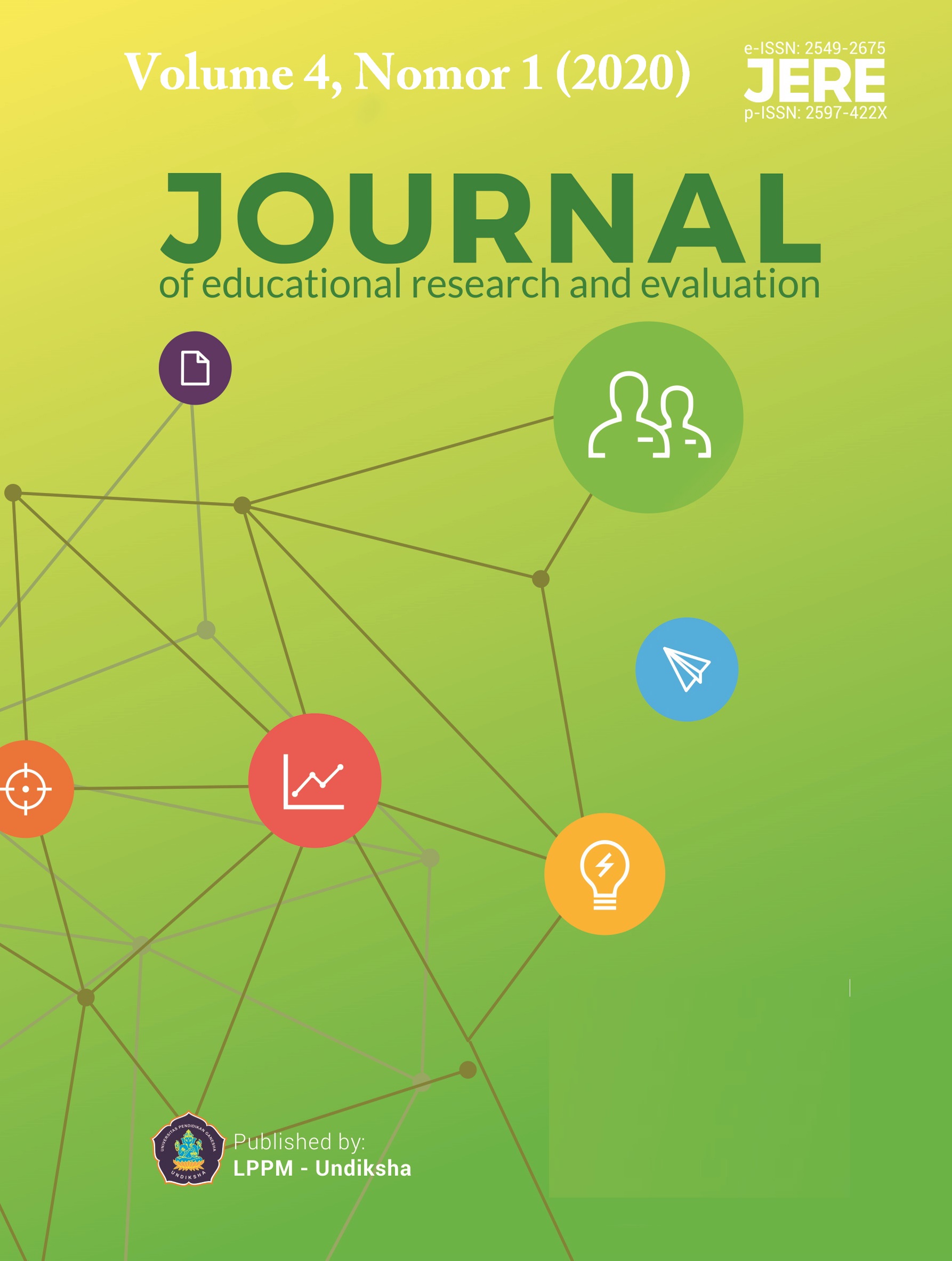The Implementation of Independent Reading Literacy Activities in Secondary Education
DOI:
https://doi.org/10.23887/jere.v4i1.23515Keywords:
Independent literacy, Literacy program, School literacy movement, Students’ literacy developmentAbstract
The present study aimed at describing the implementation of independent reading literacy activities at SMA N Bali Mandara and how it affects students’ English literacy skills. This study followed case study design, and the primary data were obtained through interview, observation, and document analysis. The results of the study revealed that the implementation of independent reading literacy activities was applied in three stages: 1) the habituation stage; 2) the development stage; and 3) the learning stage. In the habituation stage, the school used silent reading to form reading habits. This positive habit maintained by providing students real-world literacy activities in the development stage to develop their reading interest through storybook writing and cooperative literacy program. In the last stage, the teachers implemented reading for enjoyment in the learning process through news reading and book review. The students’ average score in storybook writing was 90.6, in cooperative literacy program was 90.36, in news reading program was 90.2, and in book review was 90.47. The findings of this study indicate that independent reading literacy activities are effective to enhance students’ English literacy skills.References
Abidin, Y., Mulyati, T., & Yunansah, H. (2017). Developing Literacy Learning Model Based on Multi Literacy, Integrated, and Differentiated Concept at Primary School. Cakrawala Pendidikan, 156-166.
Ahmadi, A., & Yulianto, B. (2017). Descriptive-Analytical Studies of Literacy Movement in Indonesia, 2003-2017. International Journal of Humanities and Cultural Studies, 4 (3), 16-24.
Apriani, E. (2016). A New Literacy:The Role of Technology to Develop Student’s Character. Ta’dib: Journal of Islamic Education, 21 (1), 59-72.
Cullinan, B. E. (2000). Independent Reading and School Achievement. Journal of the american association of school librarians. 3, 1-24.
Erwinsah, Solin, M., & Adisaputera, B. (2019). The Concept of School Literacy Movement through Reading Time at SDIT Raudaturrahmah Pekanbaru. Budapest International Research and Critics in Linguistics and Education (BirLE) Journal, 2 (1), 145-157.
Fandiño, Y. J. (2013). 21st Century Skills and the English Foreign Language Classroom: A Call for More Awareness in Colombia. Gist Education and Learning Research Journal, 7, 190-208
Gustine, G.G. (2018). A survey on critical literacy as a pedagogical approach to teaching English in Indonesia. Indonesian Journal of Applied Linguistics, 7 (3), 531-537.
Hasanah, M., & Sholihah, R.Y. (2017). Correlation between Reading Literacy Ability and Achievement in learning Indonesian Languange in Grade X. Journal of intensive Studies on Language, Art, and Culture, 83-88.
Hobbs, R. (2016). The International Encyclopedia of Communication Theory and Philosophy. John Wiley & Sons, Inc.
Kisyani-Laksono, Retnaningdyah, P. (2017). Exploring the Use of Literacy Strategies in Junior High School Level. Advances in Social Science, Education and Humanities Research, 173, 166-169.
Kurbanoglu, S.S. (2004). An overview of information literacy studies in Turkey. The International Information & Library Review. 36, 23–27.
Lawrence, (2013). Exploring Teachers’ Perceptions of Literacy and Use of Technology in Classroom Practice: Analysis of Self-Reported Practice in One School District. Journal of Literacy and Technology, 14 (1), 51-71.
Mahecha, F.A.G. (2018). Implementing Critical Literacy in A1 Undergraduate Students. Gist Education and Learning Research Journal, 16, 100-116.
Maryam, S. (2018). Progressive Interview Learning Model as Innovation in Improving Students’ Literacy. International Journal of Language and Literature, 2 (1), 37-51.
Miller, D. (2018). Yes, You Can Find Time for Independent Reading. ASCD Express, 13 (21).
Noortyani, R. (2018). An Exploratory Study on Students’ Reading Interest Development through Independent Reading-Retelling Activity. Arab World English Journal, 9 (2).
.
OECD (2019), PISA 2018 Assessment and Analytical Framework, Paris: OECD Publishing.
Padmadewi, N.N, Artini, L.P. (2017). Model Pengembangan Budaya Literasi Bahasa Inggris Siswa Sekolah Dasar di Bali. Singaraja: Universitas Pendidikan Ganesha.
Prakoso, S.G., Yuliarti, M.S., Anggreni, L.S. (2017). The Importance of Social Media Literacy for Students in Globalization Age. The 3rd International Conference on Social and Political Science, 191–197.
Purcell-Gates, V., et al. (2012). Measuring situated literacy activity: challenges and promises. Journal of Literacy Re-search 44(4), 396– 425.
Suryawati, E. (2018). The Implementation of School Literacy Movement: Integrating scientific literacy, characters, and HOTS in Science Learning. Indonesian Journal of Biology Education. 4 (3), 215-224.
Suwono, H. (2016). School Literary Movement in Indonesia: Challenges for Scientific Literacy. International Conference on Education.
Syawaluddin, A. (2018). Effect of School Literary Movement (GLS) on Students’ Literacy Ability. International Journal of Social Science and Humanities Research, 6 (2), 785-790.
Tavdgiridze, L. (2016). Literacy Competence Formation of the Modern School. Journal of Education and Practice, 7 (26,) 107-110.
Whitten, C., Labby, S., & Sullivan, S.L. (2016). The impact of Pleasure Reading on Academic Success. The Journal of Multidisciplinary Graduate Research 2 (4), 48-64.
Downloads
Published
How to Cite
Issue
Section
License
Authors who publish with the Journal of Evaluation and Research in Education (JERE) agree to the following terms:
- Authors retain copyright and grant the journal the right of first publication with the work simultaneously licensed under a Creative Commons Attribution License (CC BY-SA 4.0) that allows others to share the work with an acknowledgment of the work's authorship and initial publication in this journal.
- Authors are able to enter into separate, additional contractual arrangements for the non-exclusive distribution of the journal's published version of the work (e.g., post it to an institutional repository or publish it in a book), with an acknowledgment of its initial publication in this journal.
- Authors are permitted and encouraged to post their work online (e.g., in institutional repositories or on their website) prior to and during the submission process, as it can lead to productive exchanges, as well as earlier and greater citation of published work. (See The Effect of Open Access)











